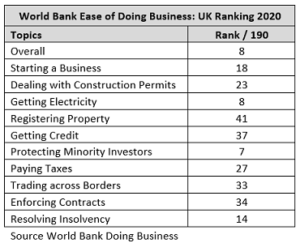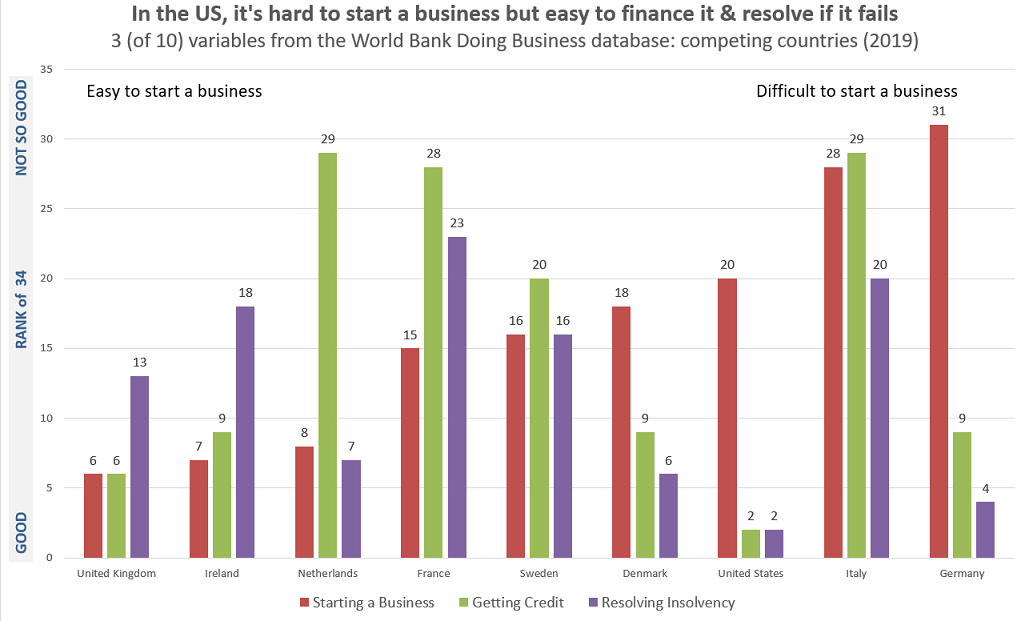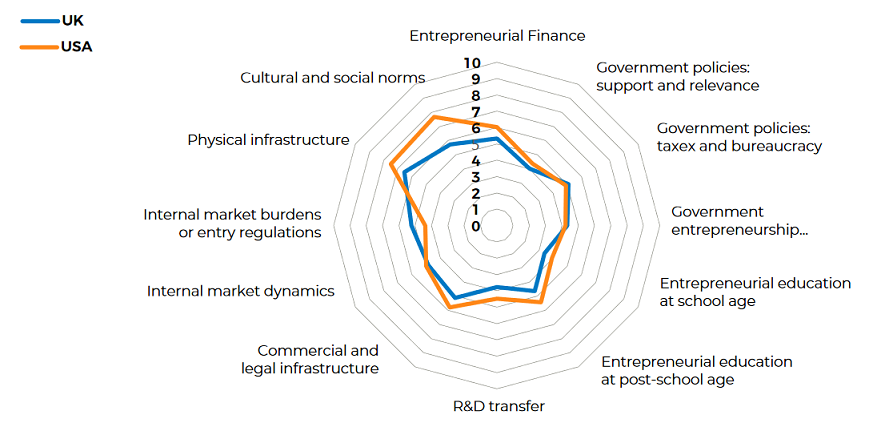Starting and growing a tech business in Newcastle. Blog 3/4
To grow a business, someone has firstly to start one and then run one. Admittedly the same person does not have both to start a business and run it, but for the moment let us assume that this is one person and that her name is Olivia1The most popular girl’s name in Britain 2019. . Olivia is interested in starting and growing a tech business.
How easy is it for Olivia to start a business and run it in the UK / Newcastle in particular?
There are two sources which inform our understanding of this. After that, we can consider the impact of these things on new business creation.
The 2 data sources that tell us about the environment for starting and running a business to grow it, are the World Bank Doing Business project and the Global Entrepreneurship Monitor project. The former offers a macro view, the latter a micro view.
Doing business in the UK is generally easier than in most other countries

Note that the variables that contribute to this overall rank cover a lot of ground. They include for example that, in some countries, it is very difficult to access electricity. Also, in some countries, Olivia would find it hard because she’s a woman.
Starting a business is relatively easy (but should it be?)

For Olivia to grow her business, I suggest we need to look at an additional variable. I discuss that variable below.
This chart shows these 3 variables for a number of competitor countries. The ranking here is different. The ranking here is based only on the 34 members of OECD, not all 190 countries in the full World Bank Doing Business Database.
The chart shows just how different is the US from these comparison countries. My interpretation is summed up in the chart headline. In the USA (to which we should aspire in terms of their ability to grow businesses), it is hard to start a business, but much easier to grow it by accessing credit, and much easier to close it, should it run into trouble.
Resolving insolvency easily is important. Things go wrong and when they do, they should be sorted out quickly. Speedy resolution means that key players can move on, learn from mistakes, and start again. Many have pointed out that, in the UK, there is a degree of shame being associated with a failed business, while in the US it is viewed as a learning experience, a stepping stone, a rite of passage. The ease with which insolvency is resolved in the US is an aspect of this.
Subtly, the fear of insolvency affects entrprepreneurs’ attitude to risk. Growing a business involves taking risks. While I do not believe that people take reckless risk, it is obvious that reducing the ‘costs’ of insolvency is likely to enhance attitude to risk.
Growing a business is about entrepreneurship – how does the UK rate?
Global Entrepreneurship Monitor has been reporting annually since 1999. The 2019 report covers 50 countries. Each country has its own research team and produces its own report to a global template and standard.
GEM has a measure called ‘Total Early Stage Entrpreneurship Activity’ (TEA) which is the combination of two measures. Measure 1 is ‘nascent entrepreneurs’.
These are individuals who commit resources, such as time or money, to starting a business. To qualify as a nascent entrepreneur, the business must not have been paying wages for more than three months. Measure 2 is ‘new business owner-managers’. These are businesses which have been paying income, such as salaries or drawings, for more than three, but not more than forty-two, months. More detail on the methodology can be found in the UK 2019 report.
TEA for the UK in 2019 was 9.9% which is close to half the US rate of 17.4%. Although I’m not a fan of spider diagrams, this one shows the key differences between the US and UK which go towards explaining this difference. A score closer to 10 is better.
A look at the variables suggest that there is little local economies can do in the UK to address these differences. However, there is one exception to this – a variable that can be addresssed locally. And a second over which a degree of influence is possible. These are the two variables to do with ‘entrpreneurial education’. One of these looks at entrepreneurial education in schools. The other looks at entrepreneurial education post school.
Entrepreneurial education in Newcastle
Recently, I have sat in on virtual meetings and also seen commentary on social media which refer to the ‘digital jobs market’ in Newcastle. Apparently, a large proportion of all advertised jobs are tech related. Also, I have heard many references to initiatives designed to enhance the ‘careers’ of young people in technology.
But enhancing her ‘career prospects’ in IT, is not what Olivia wants. She doesn’t want a career in IT. Olivia wants to start and grow an IT business. Olivia wants to offer careers in IT.
For Olivia, this is a problem. She knows (because she’s read the GEM Report on Britain), that entrepreneurial education is important, but she struggles to find it in Newcastle. Olivia has looked at the syllabuses at Newcastle schools including Newcastle’s University Technical College and has come away disappointed.
Olivia was particularly disheartened by two comments on the UTC why we’re different page.
One comment told Olivia that she’d be wearing ‘business attire’ – which is not the image Olivia has of a tech entrepreneur. The other comment told Olivia that she would be occupied during ‘9-5 working hours’. And again, this does not match the picture Olivia has of life as a tech entrepreneur.
Starting and growing (more tech) businesses will build Newcastle back better
So, based on real data comparing us with other countries, it is possible to identify things we can do to help Newcastle build more businesses and bigger businesses. However, it is important also to recognise that nothing we do will deliver results fast. Some of the things that the US does, and to which I referred in another post (like SBIR), have been in place for many years. The UK, having implemented SBIR badly, abandoned it. Policies like enhancing entrepreneurial education need commitment and review continuously.
It is possible for Newcastle to get great. It can only do that based on understaning its position in the world. That understanding is ONLY possible by analysing data.
The outcome will be more and bigger businesses
Policies are no good unless they are monitored. What is our starting point? How does Newcastle’s business demography stack up and what might be sensible targets for say 5 years? I discuss this here.

